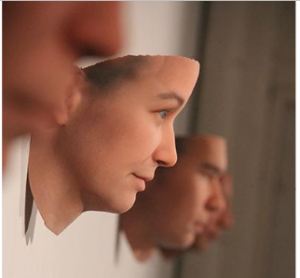Heather Dewey-Hagborg
Heather Dewey-Hagborg is a transdisciplinary artist and educator who is interested in art as research and critical practice. Her controversial biopolitical art practice includes the project Stranger Visions in which she created portrait sculptures from analyses of genetic material (hair, cigarette butts, chewed up gum) collected in public places.
Notes about the work
 Traces left by people including hair, chewed gum, cigarette butts, etc. that we don’t think twice about leaving in the world.
Traces left by people including hair, chewed gum, cigarette butts, etc. that we don’t think twice about leaving in the world.
Collected by Heather and then used as a sample for forensic DNA Phenotyping (FDP), technology being used by police departments in the U.S. to create “a descriptive profile from any human DNA sample.” Heather uses her portraits to point out that these profiles are general and are ultimately the result of a long history of technologies that “claim to use science order to classify types of bodies into socially constructed categories like genre and race.”
Heather uses the FDP results to make 3D printed portraits of the people whose genetic material she collects to put faces to the data. Only eye and hair color can be determined with accuracy, leaving the skin color to be deduced from the facial features.
- How does seeing the portraits make you feel knowing that they were created without the consent and knowledge of the subjects?
- How would you feel if you walked into a gallery and saw a portrait like this of yourself?
- What message can you take away from this piece?
- Lack of privacy?
- The power of technology to “expose” ourselves via DNA?
About Heather Dewey-Hagborg
Heather has shown work internationally at events and venues including the World Economic Forum, Shenzhen Urbanism and Architecture Biennale, the New Museum, the Centre Pompidou and PS1MOMA. Her work has been widely discussed in the media, from the New York Times and the BBC to TED and Wired. She is an Assistant Professor of Art and Technology Studies at the School of the Art Institute of Chicago and a 2016 Creative Capital award grantee in the area of Emerging Fields.
